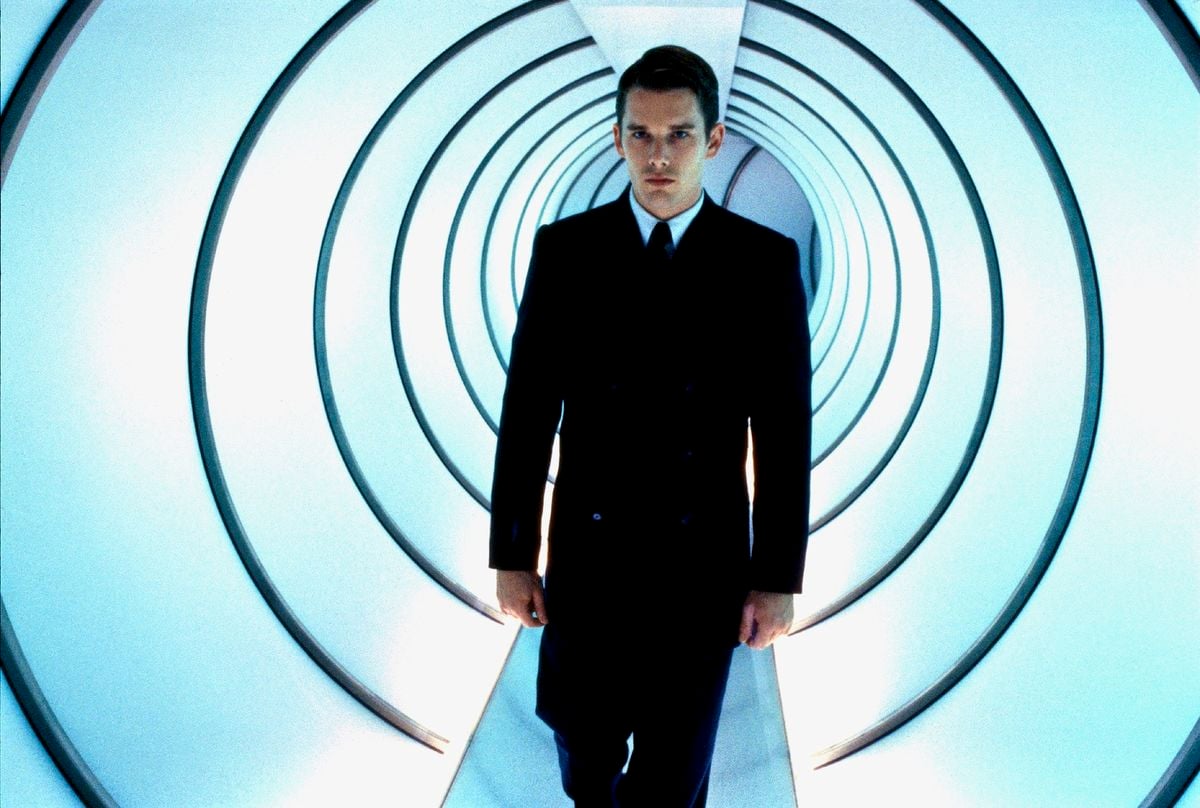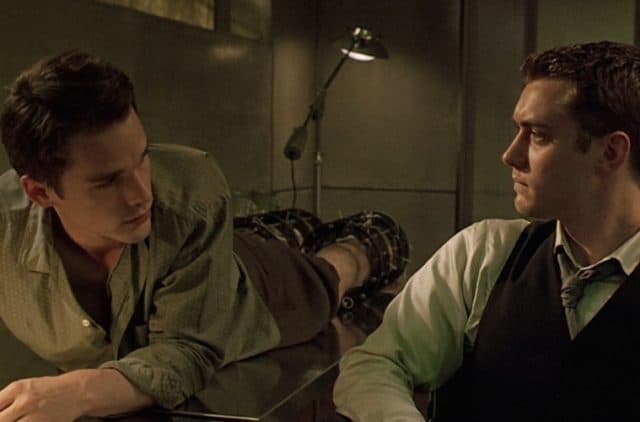Gattaca (1997)

DIRECTOR: Andrew Niccol
CAST: Ethan Hawke, Jude Law, Uma Thurman, Loren Dean, Alan Arkin, Gore Vidal, Ernest Borgnine, Xander Berkeley, Tony Shalhoub, Elias Koteas
REVIEW:
Gattaca, an impressive debut from first-time writer-director Andrew Niccol, is that rarest and most laudable of entries in the “sci-fi” genre: one that is actually seriously interested in exploring themes of societal inequality and the indomitability of the human spirit, wrapped up in an unconventional suspense thriller.
In the not-too-distant future, things outwardly aren’t that much different, but the people are. Genetic engineering has been advanced to the point where parents can now pre-order a “perfect” child who is grown from their DNA in a lab and designed out of any health problems, defects, or other real or perceived flaws. In fact, this is now so commonplace that it’s led to a sort of caste system with the bio-engineered being held as superior and the genetically inferior—those born the old-fashioned way—are relegated to menial labor. One of the latter is Vincent (Ethan Hawke), who was conceived naturally and was diagnosed with bad eyesight and a high probability of several disorders, including a heart condition that gives him a life expectancy of thirty years. His parents (Elias Koteas, Jayne Brook), regretting what at the time seemed a romantic decision, opt for a genetically perfected second child, Vincent’s athletic and “superior” brother Anton (William Lee Scott). However, Vincent does not accept his fate. Working as an adult as part of a menial cleaning crew at Gattaca Aerospace Corporation, Vincent dreams of joining the first-ever manned flight to the moons of Saturn. With the help of a shady middleman (Tony Shalhoub), Vincent gets a chance to turn his dream into reality when he makes a deal with a man named Jerome (Jude Law), who has all the right genes but was crippled in a car accident. Jerome agrees to sell Vincent his identity (supplying him with blood and urine samples, fingerprints, hair, etc.) and soon, armed with Jerome’s genetic identity which can get his foot in the door virtually anywhere, Vincent infiltrates Gattaca’s elite work force and soon proves himself among its best and brightest. But just as Vincent’s dream is on the verge of taking off—literally—a murder in the workplace causes a police investigation in which everyone including Vincent is a suspect, and the sudden unwelcome scrutiny places his meticulously-guarded cover in danger of being blown.
There’s not a lot of conventional “action” in Gattaca—Niccol isn’t interested in generic action sequences—but Niccol manages to keep the slow burn tension high without insulting the audience’s intelligence. There’s an unconventionally suspenseful sequence in which Vincent strains to complete what for him is a Herculean physical task without blowing his cover while right under the cops’ nose, as well as another where Jude Law’s wheelchair-bound “real” Jerome drags himself up a flight of stairs while the cops are coming knocking, and there’s a few twists and turns. More intriguing, however, are the underlying themes. The gulf that has emerged and is ever-widening between the genetically “perfected” and the natural-born serves for a starkly tangible allegory for social inequality and class issues, as well as the harmfulness of a system that pushes both perceived flaws and ideals of perfection. The movie repeatedly draws parallels between Vincent and Jerome, with Vincent as a supposedly “inferior” man who keeps achieving everything that is supposed to be out of his capability, and Jerome as a “perfect” specimen who fell short. Both Vincent and Jerome, the movie implies, while one was oppressed and one seemingly had it all, were both trapped by the system and its expectations, one by never being given the opportunity to show what he can do, the other by being held to such a stringent ideal of perfection that coming in second place was a crushing, embittering blow. There’s not many special effects in Gattaca; Niccol’s vision of the not-too-distant future is low-key and mostly superficially “ordinary”, making this about themes and ideas rather than sci-fi spectacle, but he directs with flair, and cinematographer Slaowimer Idziak uses filters to draw a contrast between the soft, warm colors of the outside world and the cold, harshly sterile windowless interiors of Gattaca.

While Gattaca is thematically strong, its characters are somewhat less fully-formed, and two out of three of the leads are bland. Ethan Hawke does an adequate job conveying Vincent’s single-minded determination and carefully-guarded demeanor, but his cool aloofness, while perhaps partially intentional, keeps the character at a distance. We understand and even sympathize with Vincent’s mission, but we don’t really “feel” it with him. Uma Thurman is bland as Vincent’s half-baked love interest. There’s not much chemistry between she and Hawke (ironically, considering the two became romantically involved after meeting on set), and her character feels superfluous, just an obligatory touch of romance. The best of the three principals is Jude Law, who plays Jerome as an embittered, cynical man conflicted between resenting this “inferior” man for succeeding where he did not, and living vicariously through him (and getting a certain satisfaction in sticking it to the system). In fact, Law’s Jerome is the most complex and interesting character in the movie. In the supporting cast, Alan Arkin seems to be enjoying giving his best rendition of a hard-boiled noir detective type, Gore Vidal is the mission director, Xander Berkeley is a doctor at Gattaca who might know more than he lets on, Ernest Borgnine has a glorified cameo, and Loren Dean is arguably the most visible “antagonist” as the cop snooping around Gattaca with a connection to Vincent.
While inventive and stimulating, Gattaca isn’t perfect. The overall political situation and other world-building aspects feel under-explored and the semi-romance between Vincent and Irene feels like an obligatory romance subplot and is probably the least interesting part of the movie. Another subplot—the murder mystery—is thinly-developed and serves as no more than a plot device to place Vincent in greater danger of getting exposed. It’s hard to imagine anyone really caring about the minor whodunit question (then again, it’s such a peripheral part of the plot that one could argue its thinness isn’t really a flaw). Other more intriguing elements, like the dynamic between Vincent and his brother, could have benefitted from fuller development. The movie tantalizes us with this and various other elements, but leaves us wanting more (then again, that’s better than a movie that already overstays its welcome). The cool, reserved tone keeps the characters and themes at a bit of a distance. There are powerful emotions churning under the surface—particularly in the deeply bittersweet climax—but the tone stimulates the intellect more consistently than the heart. Still, compared to so many other sci-fi flicks that use themes as window dressing for generic shoot-em-ups and car chases, it’s laudable to come across a movie that’s actually seriously interested in exploring them. Gattaca isn’t perfect, but it has something to say.
* * *